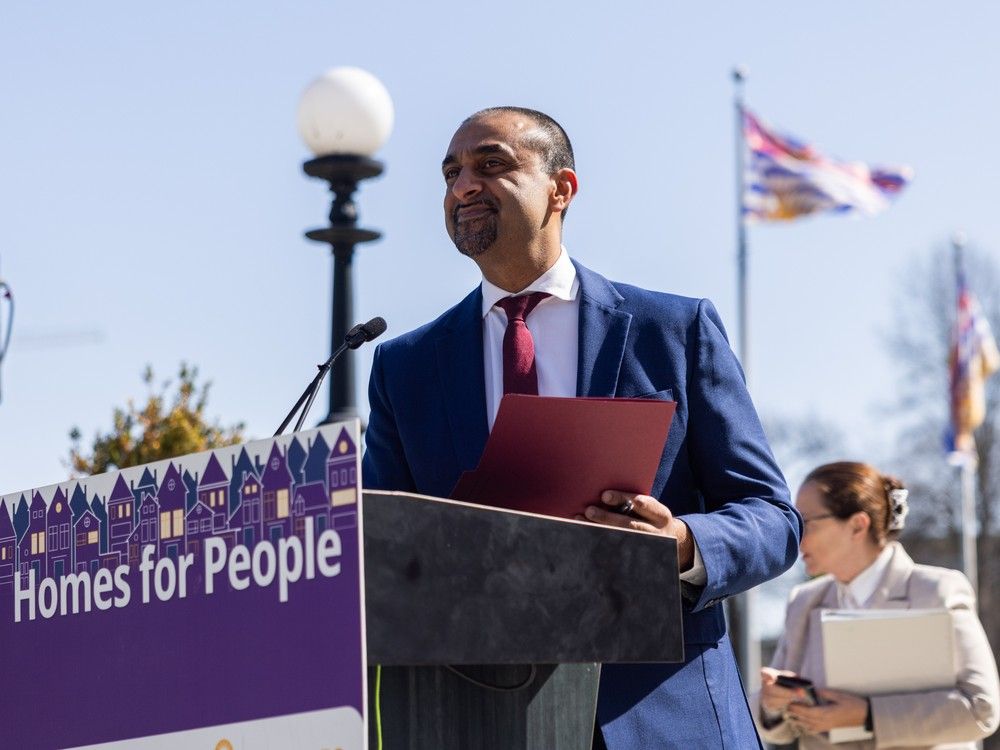
The NDP government is making changes to development cost charges that builders say could help reduce the burden they face as material and labour costs continue to increase and the number of projects under construction drop.
Starting in 2026, builders will only have to pay 25 per cent of their fees to municipalities up front and will be able to defer the remaining 75 per cent for four years or until people move into the building.
The fees help cover the cost of infrastructure such as community centres, roads, sewers and parks.
The changes will also allow developers to use bonds instead of irrevocable letters of credit as financial guarantees, allowing them to preserve access to capital throughout the project.
Wendy McNeil, CEO of the Homebuilders Association Vancouver, said the changes will allow builders certainty when it comes to the cost of the project and the timeframe for making payments to municipalities.
“I think this is great news. This announcement, it really shows there is appetite and responsiveness to the industry’s concerns,” said McNeil.
She said it will also allow builders to invest in future projects instead of having a large portion of their capital tied up in a single project.
“It’s all about certainty, and that’s the biggest hurdle that the industry is facing, or was facing is that the different charges, different schedules and different tools really didn’t make it easy for builders to do business.”
A June report by the Canada Mortgage and Housing Corporation found B.C. housing starts fell from 53,118 units in April to 37,455 in May, a reduction of just under 30 per cent. Additionally, B.C.’s housing starts are over 4,000 units lower than they were at the same time last year.
Housing Minister Ravi Kahlon said Wednesday that the province has already done significant work to bring down the cost of housing and increase supply by placing restrictions on short-term rentals, spending on affordable housing, and upzoning near transit stations and in single-family neighbourhoods.
He acknowledged there is more to do to encourage construction, which is why the government is now making changes to development cost charges.
“It’s hard to move forward on projects because the costs were built in at a different price point. And so that means we have to innovate. We have to find new ways to ensure that we’re able to lower costs.”
Surrey Mayor Brenda Locke and Delta Mayor George Harvie joined Kahlon for the announcement, as did Anne McMullin, president of the Urban Development Institute.
All three said they have seen projects stall because developers can’t afford the costs placed on them before construction even begins.
Langley Township Mayor Eric Woodward said the changes are something municipalities have been pushing for.
“The municipalities were not able to do this until now and didn’t have the legislative authority to implement this themselves,” he said.
“At the moment, I see that they’re making a number of these rather obvious changes. I think we would like to see them focus on only the things that they can do, such as get construction costs down and help municipalities and the developers with financing costs.”
Chris Gardner, president of the Canadian Federation of Independent Business, said that while the changes to the development cost charges were a step in the right direction, they don’t fix other issues slowing the pace of housing construction.
He said the goal should ultimately be to have the senior government shoulders more of the cost when it comes to building infrastructure such as roads and sewers, which would reduce the burden on municipalities and allow them to lower development fees for builders.
“We need to look at how we take costs out of housing construction, the fees and taxes that the province and the municipalities levy on housing. That is a crucial element to getting buyers back into the market,” said Gardner.
“Right now we’ve got interest rates that are still higher than a lot of would like to see when they go apply for mortgages, a lot of economic uncertainty because of the economy as a whole that’s been compounded by the Trump tariffs and then the inability of the B.C. economy as a whole to really fire on all cylinders and produce strong private sector job growth.”